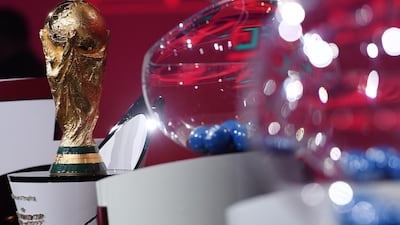Holders France were handed an awkward draw in qualifying for the 2022 World Cup on Monday, with Ukraine and Bosnia and Herzegovina standing in their way on the road to the finals in Qatar, while England will face Robert Lewandowski and Poland in their group.
Gareth Southgate's England, semi-finalists in 2018 in Russia, will also take on Hungary and Albania as well as two of international football's minnows, Andorra and San Marino, in Group I.
France will also face Finland, who recently beat them in a friendly in Paris, in Group D, with Kazakhstan completing the group that was drawn in a virtual ceremony at Fifa's headquarters in Zurich due to the Covid-19 pandemic.
Didier Deschamps' side are in a group of just five teams because they will be involved in the finals of the Uefa Nations League in Italy next October.
One of the most significant results of Deschamps' time as France coach came in qualifying for the 2014 World Cup, when his side faced Ukraine in a deciding play-off. They lost 2-0 in the first leg in Kiev before winning 3-0 in the return.
"A qualifying campaign is always a long road where there can be pitfalls," Deschamps said. "It is better to avoid them."
As for England, it is the seventh time they have been drawn with Poland in World Cup qualifying.
Their most recent encounters came in the campaign for the 2014 finals, with the sides drawing 1-1 in Warsaw before England triumphed 2-0 at Wembley.
Most famously, England missed out on a place at the 1974 World Cup after losing 2-0 in Poland and then being held 1-1 at Wembley.
"There's a great history of that fixture. There was a spell when we seemed to draw them every time," said Southgate.
Fixture pile-up
The European qualifying competition begins in March, with 13 countries from the continent going through to the 32-team finals.
There will be three rounds of fixtures in March, three more in September and two each in October and November.
That will only increase pressure on a fixture calendar that is already packed, especially with the postponed Euro 2020 set to go ahead in June and July.
That means a team that reaches the final of Euro 2020 can expect to play 17 competitive games between March and November next year.
Only the winners of the 10 groups will qualify automatically for the finals, which are to take place in November and December of 2022.
The 10 runners-up will go into play-offs alongside the two best Nations League group winners who miss out on qualifying via the traditional path.
Those play-offs, in March 2022, will produce three more qualifiers in total.
Germany, whose coach Joachim Low has been under severe pressure after poor recent results for the 2014 World Cup winners, will be expected to come through a group in which Romania and Iceland appear their main threats.
Reigning European champions Portugal's main opposition will come from Serbia and the Republic of Ireland in Group A. Cristiano Ronaldo will be 37 by the time the finals come around.
Spain notably drew Sweden and Greece in Group B, while Italy must take on Switzerland in Group C.
Belgium, the world's top-ranked team, will meet Wales. The sides met in the Euro 2016 quarter-finals with Wales coming out on top.
"We are not going to complain about the draw," said Belgium coach Roberto Martinez.
"It will also be an emotional reunion for me because it was in Wales, at Swansea, where I started my coaching career in 2007."
After qualifying for Euro 2020 to reach their first major tournament since the 1998 World Cup, Scotland were handed just about as kind a draw as possible on the road to 2022 as they were placed in Group F with Denmark and Austria.
"We have to be happy with the draw but very, very wary that it will be a dangerous draw as well," said Scotland manager Steve Clarke, whose side also face familiar foe Israel, the Faroe Islands and Moldova.

